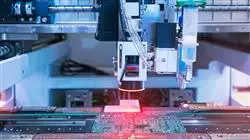University certificate
The world's largest faculty of information technology”
Why study at TECH?
Through this Postgraduate diploma, you will adopt the most updated protocols to implement robotics tools in order to optimize the production processes of a company"

In the past, workers in different sectors of activity have had to undergo complex and monotonous tasks involving long and arduous working hours. However, the emergence of cutting-edge Automation mechanisms and Artificial Intelligence devices has allowed not only to speed up the work of these professionals, but also to minimize the companies' production costs. Against this backdrop, IT specialists with a high level of expertise in the implementation, management and supervision of these technological systems are in great demand in a work environment that is immersed in constant digitization.
For this reason, TECH has created this program, with which the student will obtain the most relevant and up-to-date knowledge regarding Automation and Artificial Intelligence, in this way boosting their growth in this sector. Throughout this educational period, you will identify the best strategies to undertake predictive maintenance of automation systems or establish the potential of virtual assistants in the performance of certain tasks. In the same way, you will learn how to detect opportunities to implement RaaS and robotics services in companies.
Since this Postgraduate diploma is developed through a 100% online methodology, students will be able to combine their excellent learning with their personal and professional duties. In addition, this program is designed and taught by high caliber specialists active in the area of Automation and Artificial Intelligence. Therefore, the knowledge adopted by the student will be fully up-to-date.
Learn, with this program, how to optimally detect opportunities to implement RaaS and robotics services in the different areas of a company"
This Postgraduate diploma in Automation and Artificial Intelligence contains the most complete and up-to-date program on the market. The most important features include:
- The development of case studies presented by experts in technological IA solutions
- The graphic, schematic, and practical contents with which they are created, provide practical information on the disciplines that are essential for professional practice
- Practical exercises where the self-assessment process can be carried out to improve learning
- Its special emphasis on innovative methodologies
- Theoretical lessons, questions to the expert, debate forums on controversial topics, and individual reflection assignments
- Content that is accessible from any fixed or portable device with an Internet connection
This Postgraduate diploma has a 100% online methodology that will allow you to learn without having to depend on uncomfortable pre-established schedules"
The program's teaching staff includes professionals from the sector who bring their work experience to this program, in addition to renowned specialists from prestigious reference societies and universities.
Its multimedia content, developed with the latest educational technology, will allow the professional a situated and contextual learning, that is, a simulated environment that will provide an immersive training programmed to train in real situations.
This program is designed around Problem-Based Learning, whereby the professional must try to solve the different professional practice situations that arise during the educational year. For this purpose, the students will be assisted by an innovative interactive video system created by renowned and experienced experts.
Enjoy a wide range of different textual and multimedia formats to choose the ones that best suit your study needs"

Thanks to this program, you will adopt the most sophisticated strategies to undertake predictive maintenance of the different Automation systems"
Syllabus
The syllabus of this program is made up of 3 modules with which the student will delve into the field of Automation and Artificial Intelligence to learn its intricacies. All of the teaching materials you will have at your disposal throughout this program are available in a wide range of textual and interactive formats. Due to this and through a 100% online methodology, the computer scientist will obtain a resolute and achievable teaching with only a device with Internet connection.

This plan, designed by the best experts in Automation and AI, will provide you with the most up-to-date teaching content in these fields"
Module 1. Industry 4.0 Automation Systems
1.1. Industrial Automation
1.1.1. Automation
1.1.2. Architecture and Components
1.1.3. Safety
1.2. Industrial Robotics
1.2.1. Fundamentals of Industrial Robotics
1.2.2. Models and Impact on Industrial Processes
1.3. PLC Systems and Industrial Control
1.3.1. PLC Evolution and Status
1.3.2. Evolution of Programming Languages
1.3.3. Computer Integrated Automation CIM
1.4. Sensors and Actuators
1.4.1. Classification of Transducers
1.4.2. Types of Sensors
1.4.3. Standardization of Signals
1.5. Monitor and Manage
1.5.1. Types of Actuators
1.5.2. Feedback Control Systems
1.6. Industrial Connectivity
1.6.1. Standardized Fieldbuses
1.6.2. Connectivity
1.7. Proactive / Predictive Maintenance
1.7.1. Predictive Maintenance
1.7.2. Fault Identification and Analysis
1.7.3. Proactive Actions Based on Predictive Maintenance
1.8. Continuous Monitoring and Prescriptive Maintenance
1.8.1. Prescriptive Maintenance Concept in Industrial Environments
1.8.2. Selection and Exploitation of Data for Self-Diagnostics
1.9. Lean Manufacturing
1.9.1. Lean Manufacturing
1.9.2. Benefits Lean Implementation in Industrial Processes
1.10. Industrialized Processes in Industry 4.0. Use Case
1.10.1. Project definition
1.10.2. Technological Selection
1.10.3. Connectivity
1.10.4. Data Exploitation
Module 2. Big Data and Artificial Intelligence
2.1. Fundamental Principles of Big Data
2.1.1. Big Data
2.1.2. Tools to Work With Big Data
2.2. Data Mining and Warehousing
2.2.1. Data Mining Cleaning and Standardization
2.2.2. Information Extraction, Machine Translation, Sentiment Analysis, etc
2.2.3. Types of Data Storage
2.3. Data Intake Applications
2.3.1. Principles of Data intake
2.3.2. Data Ingestion Technologies to Serve Business Needs
2.4. Data Visualization
2.4.1. The Importance of Data Visualization
2.4.2. Tools to Carry It Out Tableau, D3, matplotlib (Python), Shiny®
2.5. Machine Learning
2.5.1. Understanding Machine Learning
2.5.2. Supervised and Unsupervised Learning
2.5.3. Types of Algorithms
2.6. Neural Networks (Deep Learning)
2.6.1. Neural Network: Parts and Operation
2.6.2. Types of Networks CNN, RNN
2.6.3. Applications of Neural Networks; Image Recognition and Natural Language Interpretation
2.6.4. Generative Text Networks: LSTM
2.7. Natural Language Recognition
2.7.1. PNL (Processing Natural Language)
2.7.2. Advanced PLN Techniques: Word2vec, Doc2vec
2.8. Chatbots and Virtual Assistants
2.8.1. Types of Assistants: Voice and Text Assistants
2.8.2. Fundamental Parts for the Development of an Assistant: Intents, Entities and Dialog Flow
2.8.3. Integrations: Web, Slack, WhatsApp, Facebook
2.8.4. Assistant Development Tools: Dialogflow, Watson Assistant
2.9. Emotions, Creativity and Personality in IA
2.9.1. Understand How to Detect Emotions Using Algorithms
2.9.2. Creating a Personality: Language, Expressions and Content
2.10. Future of Artificial Intelligence
2.11. Reflections
Module 3. Robotics, Drones and Augmented Workers
3.1. Robotics
3.1.1. Robotics, Societies and Cinema
3.1.2. Components and Parts of Robot
3.2. Robotics and Advanced Automation: Simulators, Cobots
3.2.1. Transfer of Learning
3.2.2. Cobots and Case Uses
3.3. RPA (Robotic Process Automatization)
3.3.1. Understanding RPA and its Functioning
3.3.2. RPA Platforms, Projects and Roles
3.4. Robot as a Service (RaaS)
3.4.1. Challenges and Opportunities for Implementing RaaS Services and Robotics in Enterprises
3.4.2. Operation of a Raas system
3.5. Drones and Automated Vehicles
3.5.1. Components and Drones Operation
3.5.2. Uses, Types and Applications of Drones
3.5.3. Evolution of Drones and Autonomous Vehicles
3.6. The Impact of 5G
3.6.1. Evolution of Communications and Implications
3.6.2. Uses of 5G Technology
3.7. Augmented Workers
3.7.1. Human-Machine Integration in Industrial Environments
3.7.2. Challenges in Worker-Robot Collaboration
3.8. Transparency, Ethics and Traceability
3.8.1. Ethical Challenges in Robotics and Artificial Intelligence
3.8.2. Monitoring, Transparency and Traceability Methods
3.9. Prototyping, Components and Evolution
3.9.1. Prototyping Platforms
3.9.2. Phases to Make a Prototype
3.10. Future of Robotics
3.10.1. Trends in Robotization
3.10.2. New Types of Robots

Enroll in this Postgraduate diploma and get an effective and decisive teaching through teaching formats such as the self-assessment test or the explanatory video"
Postgraduate Diploma in Automation and Artificial Intelligence
In today's world, technology is advancing at a breakneck pace and is transforming the way we live and work. Automation and artificial intelligence (AI) are two of the main driving forces behind this technological revolution. At TECH Global University, we understand the importance of staying current in this highly competitive and constantly evolving environment. That is why we present our Postgraduate Diploma in Automation and Artificial Intelligence. Our University Expert program is designed for professionals who wish to acquire solid skills in automation and artificial intelligence. The online mode of this program offers exceptional flexibility, allowing you to learn at your own pace and from anywhere in the world. This means you can continue to work full-time while enhancing your knowledge and skills in this cutting-edge area.
Study in online mode and find educational quality
Automation and artificial intelligence are transforming a wide range of industries, from healthcare and manufacturing to banking and logistics. By completing our program, you'll be prepared to apply advanced automation and AI concepts and techniques in your field of expertise, enabling you to improve efficiency, reduce costs and make more informed decisions. In addition, TECH Global University prides itself on providing a highly interactive online learning environment. You will connect with peers from around the world, allowing you to collaborate on projects and discuss ideas in a global community of learners. Automation and artificial intelligence are the future, and TECH Global University gives you the opportunity to be at the forefront of this revolution. Boost your career and prepare to lead in an increasingly automated and intelligent world - enroll in our Postgraduate Diploma in Automation and Artificial Intelligence and take the next step towards an exciting future full of opportunities!







